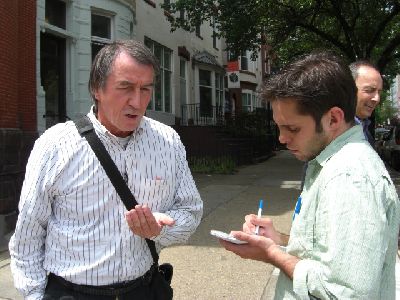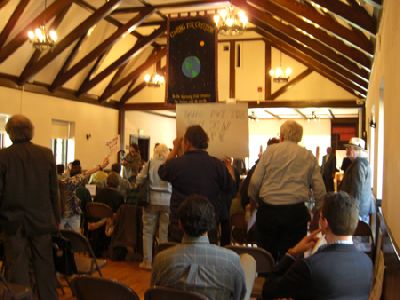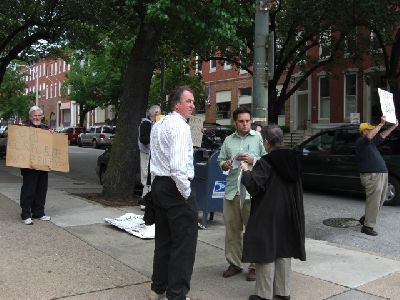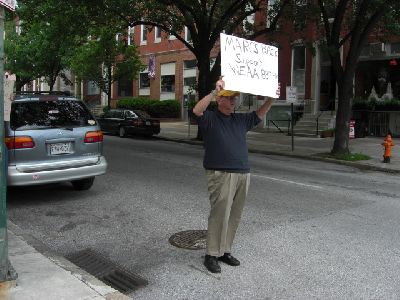Baltimore IMC : http://www.baltimoreimc.org
LOCAL News :: Activism : Baltimore MD : Media
WYPR Board Meets About Revenue, Ignores Community Outrage
WYPR's board of directors met on May 21st, the second meeting since the public radio station fired station co-founder and iconic radio host Marc Steiner. While last time they closed their meeting midway after an eruption of catcalls and boos, this time they simply did not discuss the issue.
The board of the Baltimore-based public radio station WYPR has sealed itself off from the controversy it created after the station management fired station co-founder and popular, progressive radio host Marc Steiner.
Since then, under the leadership of WYPR board chairperson Barbara Bozzuto and WYPR President Tony Brandon, the station has revealed itself to be a "public" radio station with an eye on increasing its revenue stream.
WYPR is casting its eye statewide. WYPR increasingly is looking to the suburbs for audience share and membership dollars in the wake of signal-power purchases that have bought WYPR farther into Maryland counties and to Ocean City.
WYPR’s fiscal year runs from May 15 to May 15. Their total revenues in 2007-2008 were $4.9 million, according to the WYPR board. Total expenses $4.412 million. They ended the year with a surplus of $479,000.
WYPR fired Marc Steiner in an abrupt press release to the media on Feb. 1, 2008, citing what is now known as the false reason of "ratings." The move always has been about a "fundamental difference of vision," to quote WYPR board chairperson Barbara Bozzuto at the last, April 15 WYPR board meeting.
This revelation came as a response to sustained community outcry; emails and letters sent to the station; and over 1,100 people signing an online petition to bring back the Marc Steiner Show. Their belated candor does not change the fact that WYPR’s management team tried to cover these “fundamental differences” up, but relented only when the public and donating WYPR members remained insistent and unsatisfied.
WYPR chairperson Ms. Bozzuto at that April 15 meeting further stated that Marc Steiner would never be brought back to WYPR. Catcalls ensued. She called the meeting into "executive session." The board walked out.
On May 21, WYPR's board met at The Family Tree on North Charles Street in a small space permitting only 8 members of the public to attend.
A week and a half before, WYPR announced on their Web site that the May 21 meeting would be closed to the public. It would be broadcast, supposedly, online.
Either The Family Tree or WYPR board members themselves relented and opened the meeting.
WYPR kept the meeting in a small room where only few could attend. Eye witnesses say that two empty chairs remained--and more could have been fit in--yet none of that happened and people waited outside to get in.
The WYPR board's hour-long discussion on May 21 was dominated by talk of revenue, followed by ratings, and then small talk among themselves, according to public witnesses including Maria Allwine. They did not discuss programming. They did not mention Marc Steiner.
This narrow vision for a public radio station is a major reason why three months after the firing of Marc Steiner around 20 people came to protest WYPR's board meeting.
Protesters are asking for a number of demands. The most common are these, in order of importance: 1) Reinstate the Marc Steiner Show. 2) Make the WYPR's governing board diverse in ethnicity, age, and economic status. 3) Fire WYPR President Tony Brandon 4) Ensure WYPR adheres to a non-commercial, public radio mission. 5) Lastly, improve WYPR's Community Advisory Board so that it functions as an independent voice representing the community.
Marc Steiner since Feb. 1 has shifted his reporting and work to his own foundation, The Center for Emerging Media. It can be found at www.centerforemergingmedia.com.
This spring, Steiner offered three great podcasts there about the violence in Baltimore City schools. In separate podcasts, he interviewed a roundtable of teachers, students, and school CEO Dr. Andres Alonso. The series gives a full spectrum perspective. It can be found online at www.centerforemergingmedia.com/newest-programs/newest-programs.
This week Steiner debuted on WEAA 88.9, a community radio station run by Morgan State University. He will be conducting town hall meetings on WEAA again through the near-term future. WEAA also recently began broadcasting Democracy Now! in the mornings from 8 a.m. to 9 a.m.
According to WYPR's May 21 board meeting, two growing revenue streams for WYPR are their new Ocean City, Maryland station and podcasting content from other organizations on the WYPR Web site.
Donating membership at WYPR comprises “almost” 33 percent of revenue, noted WYPR President Tony Brandon. WYPR as a station now seems to rely more on corporate and non-profit "underwriting" (which means sponsorship) of shows than on membership donations.
"I think our next step is going to be working closer with the WYPR Community Advisory Board to make WYPR more a community station," says Maria Allwine, a former WYPR member and now a protester and public radio advocate.
"It is obvious that this board is so hostile to the community," says Allwine, who witnessed the May 21 board meeting as one of the few allowed in.
Allwine says she was shocked the board refused to allow anyone from the public to even ask one question.
"It shows how badly this station is in need of oversight." Allwine and others plan to seek investigation and redress at the Corporation for Public Broadcasting.
Further information
1) For weekly coverage, see www.saveWYPR.com.
2) For the Reinstate Marc Steiner Show Petition, see:www.thepetitionsite.com/1/bring-marc-steiner-back-to-wypr.
3) For WYPR, see www.WYPR.org.
Gregg Mosson is an independent reporter and author of "Season of Flowers and Dust" (Goose River Press). More can be found at his Web site at www.greggmosson.com
Views
Information
Search
This site made manifest by dadaIMC software




